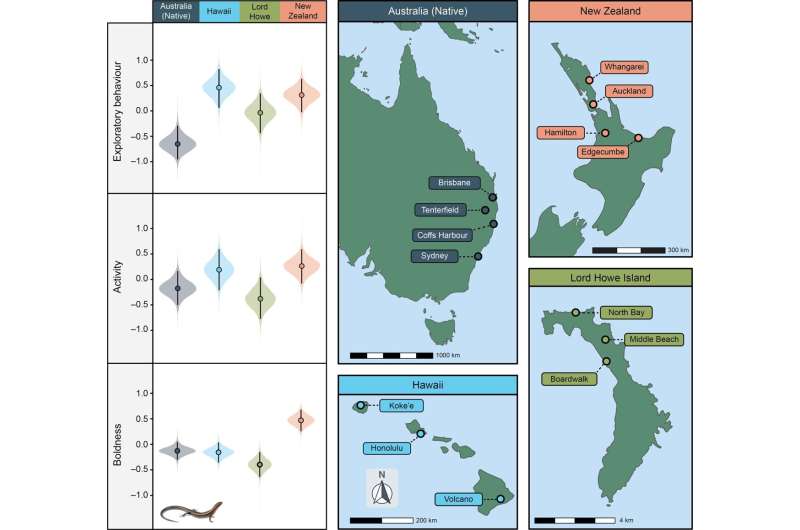Lizards with 'outgoing' personalities are better invaders

A new international study led by Monash University biologists has found that behavior influences the success of an invasive species.
The study, published today in Nature Communications, focused on the only Australian lizard species, the delicate skink (Lampropholis delicata), that has become invasive overseas.
The delicate skink is native to eastern Australia, but has been inadvertently introduced (via freight and cargo) to New Zealand, the Hawaiian Islands, and Lord Howe Island, where it is invasive.
The researchers examined the behavior of lizards across the species' native and introduced range.
"We found that the lizards from the invasive population were consistently bolder, and more exploratory compared to their native counterparts," said co-lead study author Annie Naimo, a recent Ph.D. graduate from the Monash University School of Biological Sciences.
Invasive species are a leading cause of biodiversity loss, and cost the Australian economy billions of dollars every year.
Several previous studies have highlighted that species behave differently in their invasive range, compared to their native range but this study provides an explanation for how this shift in behavior may happen.
The researchers found that the invasion process filtered out "introverts," meaning that the individuals taken to new locations in cargo and freight were bolder, and more exploratory.
"These characteristics may increase their chances of invasion success," said study lead-author Professor David Chapple, also from the School of Biological Sciences.
"Thus, behavior provides the lizards with a hitchhiker's guide to the Pacific region," Professor Chapple said.
Previous studies have mainly investigated behavioral changes in a single invasive population, making it difficult to disentangle selective filtering during invasion from initial founder effects.
However, in this study researchers measured exploratory behavior, activity, and boldness in 520 lizards from 14 populations, across three independent invasive lineages (Hawaii, New Zealand, Lord Howe Island), as well as their Australian native range source regions (Sydney, Coffs Harbor, Tenterfield, and Brisbane).
"The study emphasizes the importance of behavior in invasion biology and suggests that biological invasions may favor risk-prone individuals that are particularly adept at altering their behavior in response to environmental change," Professor Chapple said.
More information: David G. Chapple et al, Biological invasions as a selective filter driving behavioral divergence, Nature Communications (2022). DOI: 10.1038/s41467-022-33755-2
Journal information: Nature Communications
Provided by Monash University


















